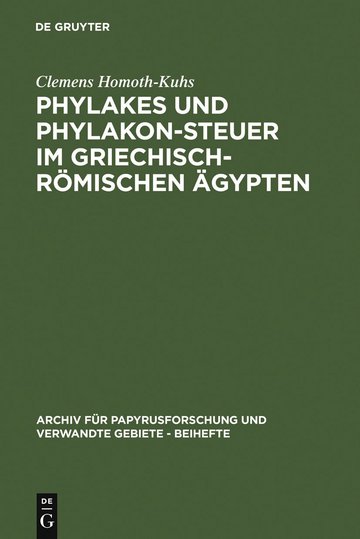Phylakes und Phylakon-Steuer im griechisch-römischen Ägypten
Ein Beitrag zur Geschichte des antiken Sicherheitswesens

| Autor | Clemens Homoth-Kuhs |
|---|---|
| Verlag | Walter de Gruyter GmbH & Co.KG |
| Erscheinungsjahr | 2005 |
| Reihe | Archiv für Papyrusforschung und verwandte Gebiete ? BeihefteISSN 17 |
| Seitenanzahl | 235 Seiten |
| ISBN | 9783110961348 |
| Format | |
| Kopierschutz | Wasserzeichen |
| Geräte | PC/MAC/eReader/Tablet |
| Preis | 149,95 EUR |
Guards (Greek Phylakes) were common in antiquity and can be understood as forerunners of modern police men, and till nowadays guard duties are part of police activities. In all times endangered persons, buildings or properties as well as precious goods or funds needed protection, which was provided by different kinds of guards. In Graeco-roman Egypt with its deep agrarian character Phylakes were a widespread institution and left their traces in the numerous papyri of this time. The present study systematically analyses all testimonies beginning with the rule of the Ptolemies until the fourth century A.D. and draws a picture of the development of this security service, which - after having been predominantly privately organized in the ptolemaic era - was enlarged by the Romans and integrated into the compulsory public service as the lowest level of the public police service. Additionally a special tax was introduced, the Phylakon-tax, whose numerous receipts for payment demonstrate, by which means the government drew the population to the financing of the public security service.


















